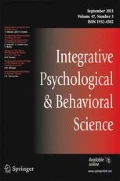Abstract
In this article, we explore a fundamental issue of Cultural Psychology, that is our “capacity to make meaning”, by investigating a thesis from contemporary philosophical semantics, namely, that there is a decisive relationship between language and rationality. Many philosophers think that for a person to be described as a rational agent he must understand the semantic content and meaning of the words he uses to express his intentional mental states, e.g., his beliefs and thoughts. Our argument seeks to investigate the thesis developed by Tyler Burge, according to which our mastery or understanding of the semantic content of the terms which form our beliefs and thoughts is an “incomplete understanding”. To do this, we discuss, on the one hand, the general lines of anti-individualism or semantic externalism and, on the other, criticisms of the Burgean notion of incomplete understanding - one radical and the other moderate. We defend our understanding that the content of our beliefs must be described in the light of the limits and natural contingencies of our cognitive capacities and the normative nature of our rationality. At heart, anti-individualism leads us to think about the fact that we are social creatures, living in contingent situations, with important, but limited, cognitive capacities, and that we receive the main, and most important, portion of our knowledge simply from what others tell us. Finally, we conclude that this discussion may contribute to the current debate about the notion of borders.
Similar content being viewed by others
References
Boghossian, P. A. (1989). Content and self-knowledge. In P. Ludlow & N. Martin (Eds.), Externalism and Self-Knowledge (pp. 149–173). Stanford: CSLI Publications.
Brown, J. (2000). Critical Reasoning, Understanding and Self-Knowledge. Philosophy and Phenomenological Research, 61(3), 659–676.
Burge, T. (1980). The content of propositional attitudes. Noûs, 14, 53–58.
Burge, T. (1982). Other Bodies. In A. Woodfield (Ed.), Thought and Object: Essays on Intentionality (pp. 97–120). Oxford: Clarendon.
Burge, T. (1993). Content Preservation. The Philosophical Review, 102(4), 457–488.
Burge, T. (2005). Introduction. In Truth, Thought, Reason: Essays on Frege (pp. 1-68). Oxford: Oxford University Press.
Burge, T. (2005/1990). Frege on Sense and Linguistic Meaning. In Truth, Thought, Reason: Essays on Frege (pp. 242–269). Oxford: Oxford University Press.
Burge, T. (2007b). Postscript to ‘Individualism and the Mental’. In Foundations of Mind (pp. 151–181). Oxford : Oxford University Press.
Burge, T. (2007c). Foundations of Mind. Oxford: Oxford University Press.
Burge, T. (2007/ 1979). Individualism and the Mental. In Foundations of Mind (pp. 100–150). Oxford: Oxford University Press.
Burge, T. (2007/1986). Intellectual Norms and Foundations of Mind. In Foundations of Mind (pp. 254-74). Oxford : Oxford University Press.
Burge, T. (2007a) Introduction. In Foundations of Mind (pp. 1–31). Oxford: Oxford University Press.
Burge, T. (2007/1992) Philosophy of Mind: 1950–2000 (addenda 2005). In Foundations of Mind (pp. 440–646). Oxford: Oxford University Press.
Davidson, D. (1973). Radical Interpretation. Dialectica, 27, 314–328.
Davidson, D. (2001/1990). Epistemology Externalized. In Subjective, Intersubjective, Objective (pp. 193–204). Oxford: Oxford University Press.
Davidson, D. (2001/1987). Knowing One’s Own Mind. In Subjective, Intersubjective, Objective (pp. 15–38). Oxford: Clarendon Press.
Davidson, D. (2001/1988). The Myth of Subjective. In Subjective, Intersubjective, Objective (pp. 39–51). Oxford : Clarendon Press.
Dummett, M. (1978/1975). Frege’s Distinction between Sense and Reference. In Truth and Other Enigmas (pp. 116–144). Cambridge, MA: Harvard University Press.
Evans, G. (1982) Varieties of Reference. John McDowell (Ed.). Oxford, New York : Clarendon Press, Oxford University Press.
Faria, P. E. (2010). Anti-individualismo e autoconhecimento: uma exposição elementar. In W. J. Silva Filho (Ed.), Mente, Linguagem e Mundo (pp. 25–35). São Paulo: Alameda.
Kallestrup, J. (2012). Semantic externalism. London/New York: Routledge.
Marsico, G. (2013). Moving between the social spaces: Conditions for boundaries crossing. In G. Marsico, K. Komatsu, & A. Iannaccone (Eds.), Crossing boundaries. Intercontextual dynamics between family and school (pp. 361–374). Charlotte: Information Age Publishing.
Marsico, G., Varzi, A.C. (2016 forthcoming). Psychological and Social Borders: Regulating Relationships. In J. Valsiner et al. (Eds.). Annals of Theoretical Psychology, 13. Psychology as a science of human being: The Yokohama Manifesto. Springer.
Marsico, G., Cabell, K. R., Valsiner, J., & Kharlamov, N. A. (2013). Interobjectivity as a border: The fluid dynamics of betweenness. In G. Sammut, P. Daanen, & F. Moghaddam (Eds.), Understanding the self and others: Explorations in intersubjectivity and interobjectivity (pp. 51–65). London: Routledge.
Nordby, H. (2005). Davidson on social externalism. Pacific Philosophical Quarterly, 86, 88–94.
Putnam, H. (1996/1975). The Meaning of ‘Meaning’. In A. Pessin, & S. Goldberg. (Eds.). The Twin Earth Chronicles: Twenty Years of Reflection on Hilary Putnam’s “The meaning of ‘meaning” (pp. 3–52). New York, London: M. E. Sharpe.
Russell, B. (1988/1910). Knowledge by Acquaintance and Knowledge by Description. In N. Salmon & S. Soames (Eds.). Propositions and Attitudes (pp.16–32). Oxford: Oxford University Press.
Sawyer, S. (2003). Conceptual errors and social externalism. The Philosophical Quarterly, 53(211), 265–273.
Silva Filho, W. J. (2013). Sem Ideias Claras e Distintas. Salvador: EDUFBA.
SimmeL, G. (2007). The social boundary. Theory, Culture and Society (SAGE, Los Angeles, London, New Delhi, and Singapore), 24(7–8), 53–56.
Valsiner, J. (2014). An invitation to cultural psychology. New Delhi, India: Sage
Varzi A.C. (2011). Boundaries, Conventions, and Realism. In J. K. Campbell et al. (Eds.), Carving Nature at Its Joints (pp. 129–153). Cambridge (MA): MIT Press.
Varzi A.C. (2013). Boundary. In E. Zalta (Ed.), The Stanford encyclopedia of philosophy, Winter 2013 Edition.
Wittgenstein, L. (2001/1921) Tractatus Logico-Philosophicus. Translated by D. F. Pears and B. F. McGuinness with an introduction by Bertrand Russell. London, New York : Routledge.
Author information
Authors and Affiliations
Corresponding author
Rights and permissions
About this article
Cite this article
Silva-Filho, W.J., Dazzani, M.V. Semantic Borders and Incomplete Understanding. Integr. psych. behav. 50, 62–76 (2016). https://doi.org/10.1007/s12124-015-9315-5
Published:
Issue Date:
DOI: https://doi.org/10.1007/s12124-015-9315-5


